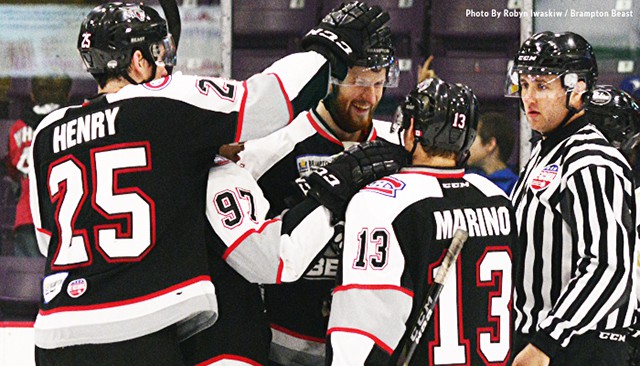Brampton Beast Sale Questions Need for City Council’s Bailout
Published August 1, 2017 at 6:24 pm

The Brampton Beast Hockey Club recently announced that they are looking for investors to purchase 49 perce
The Brampton Beast Hockey Club recently announced that they are looking for investors to purchase 49 percent of the club, opening up the bid to the public, projecting what appears to be an opportunity for the community to have a stake in the Beast’s future. However Gregg Rosen, the team’s Kingston-based owner, will keep his majority ownership of the team.
But while this all sounds like good news on the surface, it isn’t really good news overall for the City of Brampton. Last year, the city gave the Brampton Beast $1.5 million, with every member of council except Mayor Linda Jeffrey and Councillor Gurpreet Dhillon voting in the affirmative to give what some have called essentially a bailout.
The Beast asked for an immediate cash infusion of $750,000 to cover its operating costs as they anticipated losses of up to $1.5 million. Since 2013, when the Brampton Beast launched, the team has lost somewhere around $4 million.
Naturally, Councillor Dhillon didn’t mince his words in expressing his displeasure. Brampton taxpayers dollars are funding a team that was losing money anyway, he said, and now is up for sale. Dhillon believed that the money could have been better used for things like youth, seniors and drug addiction programs, as the councillor stated in this clip he posted on his Twitter feed:
Watch @gurpreetdhillon speak on @CityNews regarding @BramptonBeast decision to sell team despite last year's $1.5m Council bailout #brampoli pic.twitter.com/uoqxwndtZ2
— Gurpreet Dhillon (@gurpreetdhillon) July 31, 2017
Even with the “bailout” and an additional $20 million from Brampton to the Powerade Centre, where the Beast plays, the team has only been selling about 55 per cent of their tickets, meaning that only about half the arena is filled with paying spectators during game time. By contrast, the Mississauga Steelheads anticipate near capacity crowds for their next season at the Hershey Centre, according to Scott Rogers, the Steelheads’ Director of Business Operations, who confirmed expected ticket sales in an email to inbrampton.com.
The Brampton Beast’s general manager, Cary Kaplan, replied with an obviously more optimistic outlook on the situation.
“Bailout is the wrong word,” explains Kaplan, “It’s just like the City buys a park or community centre. Cities also invest in local hockey teams in every single city.” But are they really being a benefit to the community if they keep losing money and only half the arena is filled when they’re playing anyway? Although the Brampton Beast example is not so much related to the stadium they play in, this segment from comedian John Oliver’s new HBO series is worth watching if you wish to do a bit of a deep dive into the subject regarding sports teams and their relation to the city they set up in as their home.
Kaplan’s logic is that sports teams play an intricate role in the building of a community or a city, and that may be generally true for the majority of smaller cities who play host to various OHL or minor league sports teams. But when it comes to a point when the municipality is literally putting up millions of dollars to support you, and you’re still losing money anyway, one must start to question the viability of your continuing presence and whether you’re a benefit to the community.
It’s a difficult question, indeed.
What are your thoughts, Brampton? Is the team worth supporting on principle? Or is it a burden on taxpayers?
Follow me on Twitter @thekantastic
Photo courtesy of Brampton Beast official Facebook page
insauga's Editorial Standards and Policies advertising






